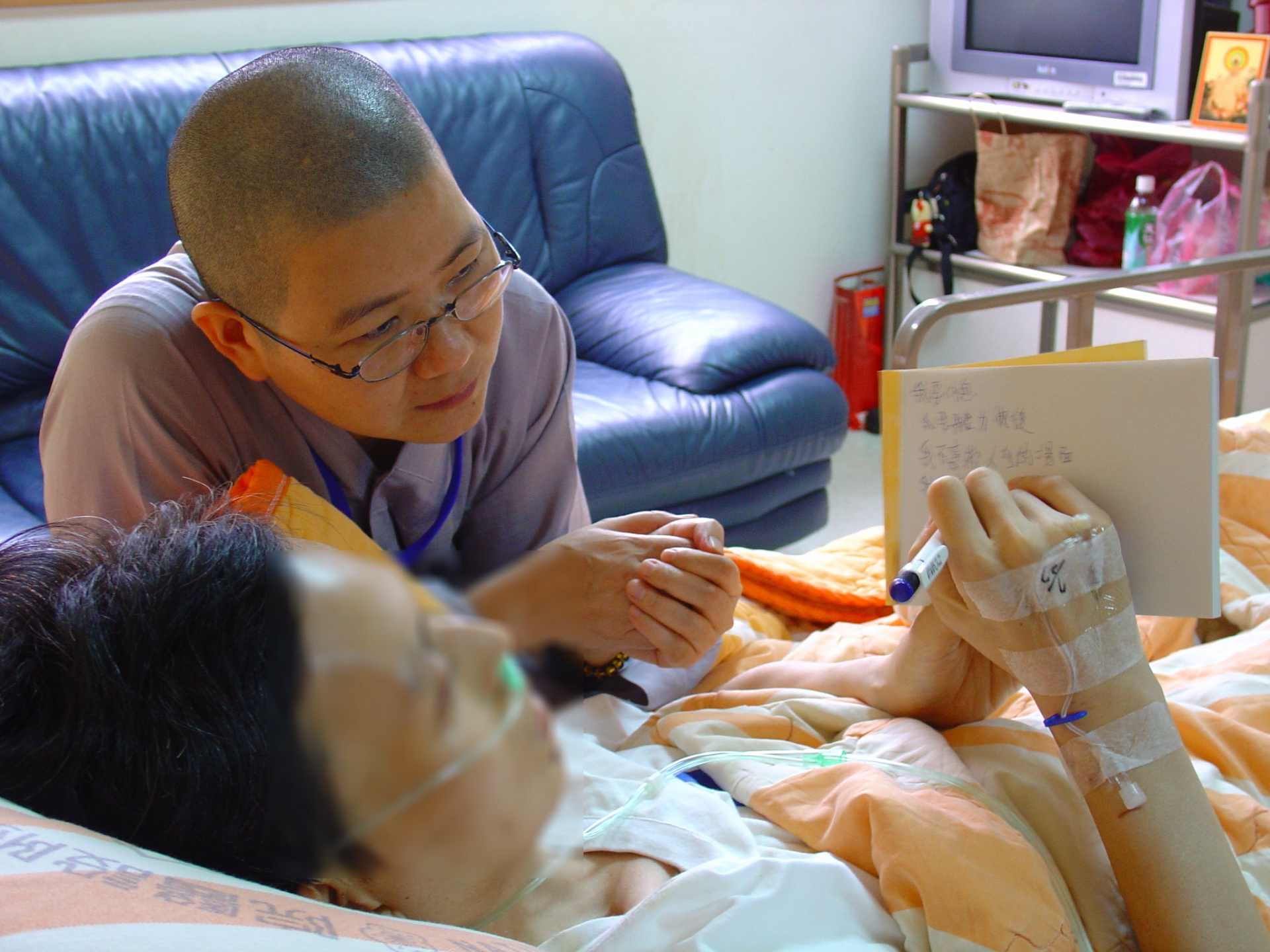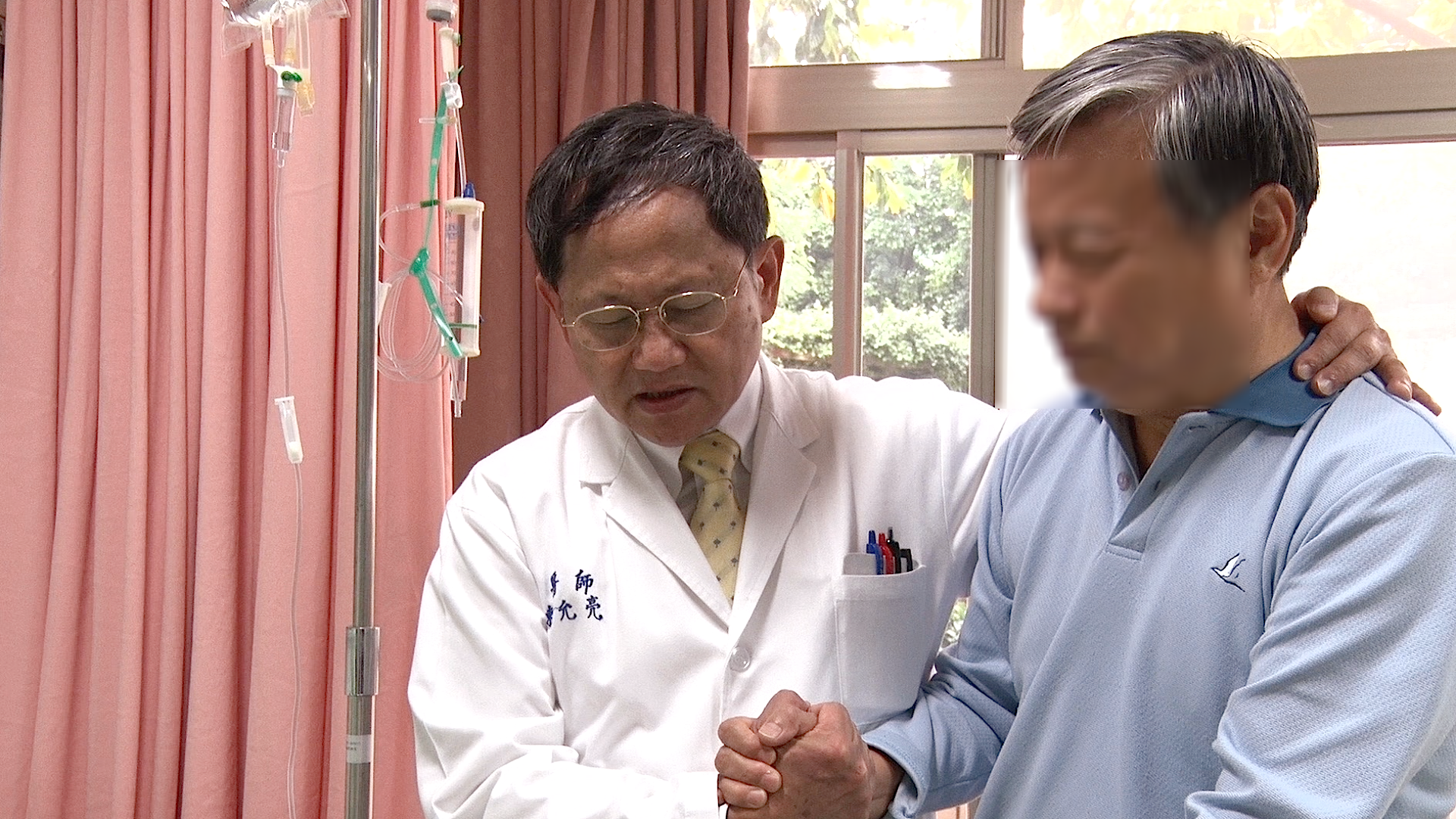Where does life come from? Where does one go after death?
Many people associate spiritual care with religion, yet spiritual care can actually be a special type of education that helps people find and embrace the true meaning of life.
Palliative and hospice care have developed significantly in nearly three decades in Taiwan. With the effort of many medical professionals, the quality of service and scale of development for pain management, grief and bereavement, and social support are high and comparable with western counterparts. However, the development of spiritual care hasn’t caught up as much and is in need for more attention.
"The current medication can relieve 90% of pain, but is not able to deal with spiritual aspects,” said Jeng-fong Chiou, CEO of Taipei Medical University’s Center of Management and Development, and also Chairman of Schweitzer Christian Missionary Alliance.
Prof. Yuen-liang Lai of Mackay Medical College points out the current issue of spiritual care in Taiwan. He says, “Since palliative and hospice care first developed in Taiwan, we’ve noticed that most spiritual care is carried out within the religious category. This is not what spiritual care is really about.”

Der-chia Bhikkhuni of DabeiXue Yuan (Great Compassion Academy) also admits,“Not only does the general public not understand, but even the medic staffs have limited understanding of what spiritual care is; they even think of spiritual care as a temporary religious consultancy.”
While it is true that explaining the meaning, value and context of life in a religious aspect is a way of providing spiritual care, it does not represent the whole aspect of spiritual care.
Searching for the answer that transcends death
The concept of spiritual care comes from Christianity. As its term is rather abstract and intangible--and even contradicts Chinese culture--spiritual care is often categorized as religious.
Yu-shin Chang, former director of the Social Work Department at Mackay Memorial Hospital explains that in Christianity, spiritual care applies to all patients in hospitals and is not confined to only the palliative patients. Most hospitals with Christian backgrounds may have chaplaincy within its structure and its service is often provided by a chaplain, “But spiritual care for palliative patients should go beyond religion. Patients who believe in Buddhism, Taoism, Islamic or atheism all need spiritual care.”
“The concept of spiritual care should be on universal values that transcend religion, like mercy, reconciliation, and love,” Yu-shin Chang continues. No religion wants to see people suffering in pain and their souls wandering. This is why the most crucial part of spiritual care is to accept and listen to patients’ worries because by building up a connection and empathizing with their feelings, spiritual care can gradually guide them to recognize the meaning of their lives and afterlife.
Yu-shin Chang stresses, “Spiritual care could be life experiences or answers guided by religion for those who are religious. For those who are not, it could be a journey to search for deeper meaning of life. This is what spiritual care is about, finding the meaning of one’s life.”
Setting up versatile spiritual care to fit different communal settings
Mackay Memorial Hospital in Danshui set up the first hospice ward in Taiwan in 1990 and the Hospice Foundation of Taiwan (HFT) was soon established afterward. Ever since, HFT’s main tasks were introducing palliative and hospice care to the public and discussing how to provide a localized spiritual care ith theoretical and practical fundamentals. HFT’s efforts ignited the foreseeable path that spiritual care goes beyond different religions, and soon, many religious groups started to set up their own spiritual care systems to support their network, including volunteer groups in hospitals or in communities. This movement has expanded the service area for spiritual care.
The Dabei Xue Yuan founded by Ms. Tsung-tueng Bhikkhuni focuses on providing spiritual care to the terminal patients who still choose to stay in communities.
Tsung-tueng Bhikkhuni previously served in National Taiwan University Hospital and was responsible for research, education and clinical service of spiritual care. During her service in hospitals, she discovered the lack of trained spiritual care professionals and discontinuity of service once patients leave hospitals. Physical discomfort can be controlled by medication, but psychological discomfort cannot. This has driven Tsung-tueng Bhikkhuni to establish Dabei Xue Yuan in 2013 and set up a training system of spiritual care volunteers. All candidates are required to fulfill beginner and advanced lessons that total 56 hours, and go through interview training and serve as observers and trainees so as to receive formal certification and offer
quality service.
“I used to think it is hard to promote spiritual care in hospitals, but now I realize that promoting it in the community is even harder because the community seems so dry like a desert. This is the place we should work harder in.” Der-chia Bhikkhuni further explains that the reason she’s stepping out of hospital systems is because she wishes to expand spiritual care to district levels, and not be limited in hospitals. “If patients stay in hospitals then we will visit them in hospitals; if they are discharged from the hospitals, then we will continue our visits to their homes.”
Jeng-fong Chiou, who started palliative and hospice care in 1990, also noticed the lack of awareness and resources in spiritual care in Taiwan, and hence, established the Schweitzer Christian Missionary Alliance in 2001. It recruits volunteers in Mackay Memorial Hospital, Taipei Medical University Hospital, Wan Fang Hospital, Saint Mary’s Hospital in Luodong, and Tung’s Taichung MetroHarbor Hospital in hopes to understand patients’ spiritual needs by clinical learning.
Via the actual feedback received from the volunteers, Schweitzer Christian Missionary Alliance invited foreign and local experts to co-draft the course content, and announced the “Catholic and Christianity spiritual care training methods and course.” The hope is to provide a systematical approach so that people who are interested in learning and providing spiritual care can equip themselves sufficiently with proper knowledge and skill.
For those who complete the course and training successfully, they have also spread out all over Taiwan to offer their professional service. In order to standardize and formalize the professional training courses, Schweitzer Christian Missionary Alliance calls for experts to organize a certificate committee. Only by going through a strict and careful exam and interview will the committee issue a qualification certificate.
Local spiritual care model endorsed by Health Promotion Administration

Years of hard work done by private sectors in spiritual care has finally been integrated in 2017 under a government funded 3-year project termed the Program of Hospice Spiritual Care as it provides training and promotion. This is the first spiritual care provider program initiated at the government level and intended to establish a spiritual care model that fits Taiwan’s unique culture and values.
Jeng-fong Chiou and the team members of Schweitzer Christian Missionary Alliance undertook the program and invited experts together to draft the standard course and guidelines for spiritual care. They also hosted relevant conferences and lectures to advance the program.
Looking back in the past two years, this program has successfully introduced the concept of spiritual care to all hospice wards in Taiwan even in the first year. Then, in the second year of the program, in response to the aging society, spiritual care was introduced to communities, nursing homes, and LTC facilities. Says Chiou, “This year is the third year, and we have two goals: one is to publish the Spiritual Care Guidelines for all clinical professionals to follow; the other is to provide online spiritual care courses and provide easier access to whoever is interested in them.”
Next step: standardize and certify
Unlike western countries that have already established certification standards for spiritual care providers, Taiwan currently doesn’t have the same system. For this, Chiou thinks “to certify is an inevitable trend. The expertise in providing spiritual care will need to be certified and recognized; otherwise, it will be difficult to encourage these professionals to continue their services in this particular field.”
With the program initiated by Health Promotion Administration (HPA), spiritual care providers currently have indirect recognition. Chiou further explains that current hospital accreditation standards have regulated all medical centers to fulfill Whole Person Care. This means hospitals will need on staff specialist psychologists, volunteers, or spiritual care associates who have received proper palliative and hospice care training to provide appropriate spiritual care. Hence, as long as the training program provided in private sectors meets the standard course guidelines, these private sectors can be recognized and authorized to certify those who wish to devote themselves in spiritual care.
Chiou also reveals the challenge of the government’s support towards spiritual care provider certification; that is, it is not an easy task in reality. Professional spiritual care providers in western countries often graduate in religious research institutes and later receive clinical training. There is no educational equivalent in Taiwan, and thus, will need deliberation of how best to establish this procedure toward certification; no doubt, the process will take considerable time.
Looking ahead: include spiritual care in education
When asked about the certification of spiritual care providers, Yuen-liang Lai holds a different opinion. “Is spiritual care provider really an occupation?” he asks. It is a question Lai ponders on during his years of palliative care service. He believes spiritual care providers should not only acquire the knowledge and skill,
but should also share a sense of mission and value; these abstract qualities are hard to be certified.
In addition, Lai adds that when the palliative team is caring for patients, every member in the team should in some way answer patients’ spiritual needs. “A human is a whole being and it is not realistic to see it as a machine and designate certain parts to certain people in charge,” Lai explains.
Yu-shin Chang also shares similar thoughts: “spiritual care needs to be responded to right away. When patients are willing to speak with the palliative team, it is impossible for us to interrupt and tell patients to ‘please wait, and I will get you a spiritual care provider to talk with you.’”
However, Chang also comments that the growing demand for palliative care has burdened the current staff; and if there is a clear job designation, patients will certainly benefit as well.
Though HPA’s 3-year program has made spiritual care visible to the public, there is still much to do in order to have the current medical education system include spiritual care in its syllabus. “Only when spiritual care education is implemented and every medic is able to perceive patients are anxious and in need of spiritual care can we see it as a success,” Chiou concludes.
